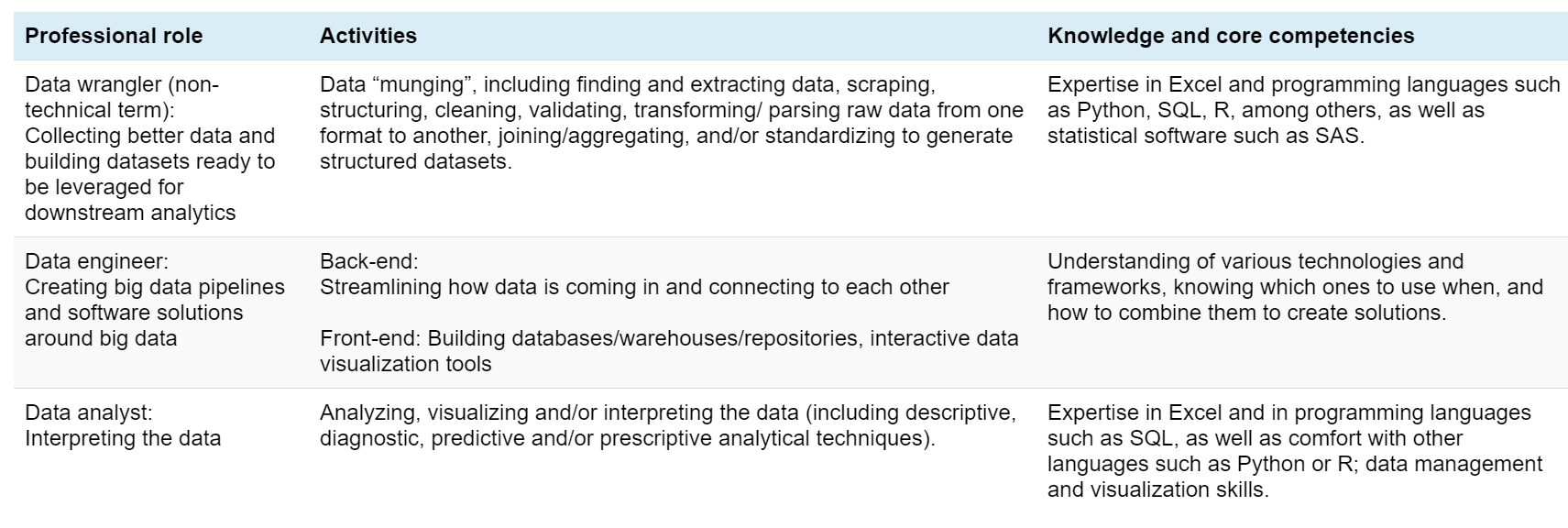
Photo Credit: Luminate and their grantee Data & Society
To take full advantage of the opportunities afforded by open data and big data analytics, for-profit and non-profit organizations alike are seeking to ramp up their in-house data expertise. This has contributed to the growing interest in and demand for data science capabilities. For social accountability funders, this means fielding requests from grantees for support in hiring data experts – sometimes without a clear definition or justification for what the role might entail.
In an effort to address this challenge, Transparency and Accountability Initiative (TAI) developed guidance for social accountability groups (and their funders) on what to consider when seeking to build data expertise. This is based on interviews with data scientists, organizational leadership, and other experts in the social accountability field.
Broadly, what we heard was that more focus should be given to defining what organizations want to solve with data and building organization-wide data literacy in order to effectively recruit and retain data experts. In doing this, most non-profits will find that the data skills they need will not fit the profile of a data scientist. Other data roles, such as data wrangling, analyzing, or engineering (as summarized in the table below), may be more appropriate given the state of their data (is it actually “big data”?) and what they want to do with it.
Below we summarize some of the key take-aways for organizations to consider.
Understanding various data roles: differences between analysts, engineers and scientists* *See report for the complete table showing varieties of role, activities, and knowledge competencies
*See report for the complete table showing varieties of role, activities, and knowledge competencies
Some take-aways to consider
- In-house or outsourced expertise?
One approach is outsourcing data expertise to consultants, fellows, volunteers, or through partnerships. When it comes to exploring one-off, advanced data science techniques and technologies, organizations could gain more from partnering with companies or experts that have already built up expertise in these areas – for example, partnering with a group such as DataKind or the non-profit arm of an Artificial Intelligence (AI) organization. While this can be helpful to bring in creative ideas and approaches, building internal staff capacity on data should remain a priority.
- What data role(s) make sense (if any)?
In an ideal world, organizations could hire a team of data people, including data wranglers, analysts, engineers, and data scientists, if needed. Practically speaking, however, non-profit funding may only cover one or two data positions (or none at all). So who should organizations hire and how can they meet their data needs with limited funding?
- Once hired, how can data experts be set up for success?
With limited resources, organizations may only hire one data person and expect them to be responsible for any and all data-related work. To prepare to integrate data experts into an organization’s strategy and operations, it is helpful to build buy-in and a broader understanding of the value of data throughout the organization and to manage expectations for what the role will entail. Additionally, more junior data staff can benefit from mentorship opportunities with senior data experts (internally or externally) particularly to add credibility and quality assurance to their work.
Ideas for funders
Of course, as a funder collaborative, TAI is always interested in what our members can be doing to better support partner organizations to be as impactful as they can be. So, how can funding be used to better address the need for data expertise field-wide? Ideas include:
- Supporting those few organizations committed to helping organizations take advantage of data science to provide a suite of services for social accountability organizations, as needs arise.
- Financing the creation of a small team of senior-level fellows as a shared resource across grantees to support them in defining and integrating data expertise within their organizations, as well as serving as mentors and advocates for more junior-level data staff.
- Enabling partnerships between social accountability organizations and well-regarded academics to agree on the data and statistical interpretation of their findings, to lend further credibility to their data-driven work.
What would be useful to your organization? Let us know on twitter via @TAInitiative and dig into the guidance to learn more. We look forward to hearing what resonates with you.
